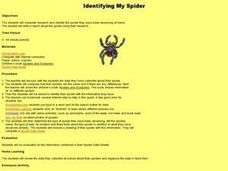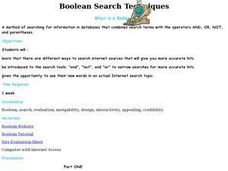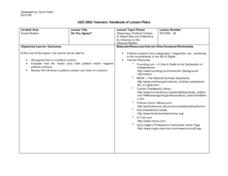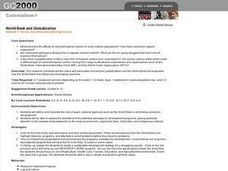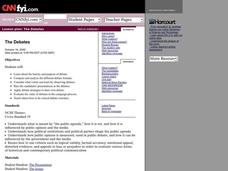Curated OER
Sampling the American Dream
Students, after viewing a variety of different and unique websites, write a short paragraph on each one that describes their reactions to specific information on unfamiliar subjects. They react to each website as personally as they can.
Curated OER
Qualitative and Quantitative Data
Seventh graders study the different ways that they have been evaluated over the years. In this qualitative and quantitative instructional activity students complete a learning activity while in groups.
Curated OER
Environmental Issues in South Carolina
Students research governmental agencies that deal with the environment and chart aspects about each agency. They role-play a city council meeting to address the topic of building a waste to energy facility.
Curated OER
The Passing of the Papacy
Students research and study the life of Pope John Paul II life. The discover how he influences others. They view web sites and pictures of Pope John Paul's life.
Curated OER
Identifying My Spider
Third graders navigate the Internet and research spiders. In this spider instructional activity, 3rd graders view photos of spiders and use their characteristics to determine the variety of spider. Students complete a spider data sheet.
Curated OER
Boolean Search Techniques
Students search using the Boolean search model. In this navigating the Internet lesson, students narrow their searches using and, or ,not and parentheses. Students recognize the differences in a one word search and one of multiple...
Curated OER
Spider Body Parts
Young scholars identify spider body parts. In this arachnid lesson, students review the story Amazing World of Spiders and discuss the various spider body parts. Young scholars fill in the correct body parts on a copy of a blank spider...
Curated OER
Music Dynamics - America the Beautiful
First graders sing America the Beautiful and understand the words to the song. In this singing social studies lesson, 1st graders become familiar with the images and vocabulary in America the Beautiful while singing the words.
Curated OER
The Froggy Page
Students investigate the cycle of life by observing tadpoles. In this biology lesson, students utilize the Internet to read stories, observe pictures, and listen to sounds of frogs. Students create a poster board collage using frog...
Curated OER
Oh, Baby!
Learners explore one's goals and dreams using a combination of research and imagination. They produce a web site that portrays a vision of one's future. They plan, conduct and write up an informal journalistic interview.
Curated OER
Le Grand Voyage
Eighth graders work in collaborative groups to research a country of their choosing. Groups use the internet to their country and plan a trip to that location. Students complete a multi-media presentation of their country, following a...
Curated OER
Understanding Community Environment
In this understanding community environment worksheet, students, after exploring 5 parts of a study unit (link provided), choose a project (make a video, book, game, plan a garden or nature map, collect data, write a rap or crossword...
Curated OER
Do You Agree?
Students recognize bias in a political cartoon, evaluate how the media uses both positive and/or negative political cartoons, and assess the influence a political cartoon can have on a person.
Curated OER
Wild Thing!
Sixth graders view several segments of the video, "How Animals Survive." They discuss elements of survival. Students list living and nonliving things found in their backyards and schoolyards. Students work in groups to complete the...
Curated OER
World Bank and Globalization
Pupils define and describe the role of the World Bank in promoting economic development. They assess the benefits and potential damages to development programs. They evaluate how the World Bank has influenced developing countries.
Curated OER
Current Events Research
Students monitor current events using on-line and traditional resources. They explore issues such as what trends they see developing in specific news issues over time and how different news stories might be interrelated.
Curated OER
Location, Location, Location!
Twelfth graders locate cities, states and countries on maps. They use the cardinal directions to locate places on maps. They describe where they were born by giving clues without naming the exact state. They trade papers and try to guess...
Curated OER
Creating an Electronic Resume for a Job Search
Students develop an appropriate resume for posting on a website for a job search. They create a web page using filamentality, and explore the web to find established career sites.
Curated OER
Is That a Fact? A Comment on Modern Fables
Learners complete literary analysis for modern fables or urban legends. In this modern fables lesson, students listen to an urban legend and discuss it. Learners then research urban legends online and write their own urban legend.
Curated OER
Making Conventions Unconventional
Students discover how Internet altered the public's involvement in the 2000 Democratic and Republican conventions, and synthesize their evaluations of convention sites to design their own pages for a convention-related Web site.
Curated OER
Researching a Company
Students conduct internet research on companies that they are interested in working for. They determine what jobs are currently available, what requirements are needed to apply for those jobs and examine the benefits provided by each...
Curated OER
Curve Fitting and the TI-85 Calculator
Seventh graders follow a step-by-step guide for using graphing calculator to determine equations which best fit data graphed. They gather data from various sites on the web, or they do searches to find information necessary to complete...
Curated OER
Making a Family Tree
Learners, in groups, produce a family tree using computers to facilitate research and presentation. They plan, discuss and evaluate different technologies used in this assignment.
Curated OER
The Debates
Students examine the history and purposes of debate, and analyze the different debate formats. They rate the candidates' presentations in the debates, and apply debate strategies to their own debates.






